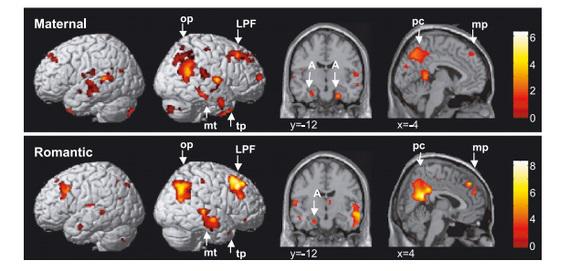1120
As the birth of a child affects a woman's brain: amazing facts about postpartum!
One friend of mine, an artist, Sarah Walker, held parallel to my surprise. She said that to be a mother - it's like to know about the existence of their home secret room, which you do not even guessed. And, you know, I am very impressed by this comparison because it differed significantly from those statements that on this occasion threw the majority of people, such as "It's time for a change!", "Life will never be the same ..." or something like that ...

What changes a lot - it is clear, and so ... But what specific neurological changes occur in a woman's body when she becomes a mother? As it kacaetsya emotional and personal level?
In fact, significant changes in the brains of women occur before birth - in the period of pregnancy. It took several centuries before scientists were able to establish a connection between the behavior of the mother and the processes occurring in the prefrontal cortex, parietal lobe of the brain and other parts of it. As we found out, the gray matter at the time of birth of the child becomes more concentrated, especially become active parts of the brain responsible for empathy, anxiety, and social interaction. All of these changes are compounded by the active production of the hormone responsible for maternal feelings, such as unconditional love, the desire to protect and defend the kid.
The study of maternal brain, according to many scientists, it is the key to understanding the causes of postpartum depression and obsessive thoughts that are so common in young mothers after childbirth. It was found that about 1 in 6 women experience postpartum depression, and many others in this period, there are dramatic changes in behavior: some, for example, frequently wash their hands, others every minute check whether their baby is breathing.
«This obsessive-compulsive disorder that can occur in women in the first months after birth. Mothers in this period characterized by high suspiciousness; they worry about things that are not subject to their control. New mothers are constantly thinking about your child. How healthy is it? And maybe he is sick with something? Safe and sound he? » I> - explains the researcher Kim Pillyang.
«In this difficult period for women recorded significant changes in various parts of the brain. In those areas of the brain that regulate emotions, activity increases significantly. That is why representatives of the animal kingdom, as well as the representatives of the human race there is a very strong maternal instinct » i>, - continues Kim.
There are several inter-related areas of the brain that are responsible for the behavior and mood of the mother.
Of great interest to scientists is almond-shaped set of neurons - the amygdala, or the amygdala, which is responsible for memory and control of emotional reactions such as fear, anxiety and aggression. Usually amygdala activity increases in a few weeks or months after birth, greatly influences the behavior of the mother. Strong work amygdala triggers the release of hormones that cause increased sensitivity to the needs of the mothers of their children. Scientists say that once the newly-mom just look at his crumb as reward centers of the brain begin to work actively. Work amygdala also affects the way the mother deals with her baby as she is attentive to their offspring, and even the power of the love she has for her child. It is therefore not surprising that the deviation in the amygdala causes an increase in the level of depression in young mothers.
Activities amygdala also makes the mother feel more strong feelings toward their child than to other children. In 2011, researchers conducted an interesting experiment: they showed some pictures moms, among them pictures of their own and strangers brood. All moms admitted that more positive emotions they evoked those pictures, which depicted their own kids. The recorded increased activity of certain brain areas in the admiration of their mothers offspring only become proof of that.
All of the complex processes that occur in the tonsils, are associated with exposure to it various hormones. As you know, this area of the brain has a high concentration of receptors of the hormone oxytocin, which is much more active than usual, produced during pregnancy.
«As we see changes occur as hormone levels, and in the brain, i> - says researcher Ruth Feldman. - oxytocin during pregnancy and the postpartum period is marked not only in humans but also in all mammals. The more caring mother takes care of their children, the higher the oxytocin levels observed in her body ». I>
Surprisingly, it is only a mom to look at their child, to hear his laugh or cry or just cuddle up to him, the level of oxytocin increases automatically. Increased levels of oxytocin during breastfeeding explains why nursing mothers are more sensitive to scream or cry baby than non-breastfeeding mothers.
According to Feldman, of particular interest is the fact that the processes that occur in a woman with childbirth, largely coincide with those which have to be observed in the first months of love. All this explains the feelings experienced by new parents at the sight of a newborn. This study proves the similarity of the brain of mother and lover, conducted in 2013.

The greatest changes in the brain occur with the appearance of a woman's first child. Neurology is unable to establish whether the returns after the birth mother's brain to a previous state.
Do not believe me, but the changes in the brain, there are also men who are actively involved in the upbringing of the newborn baby. Naturally, the level of oxytocin in both men and in the proportion that does not fall hormonal storm that occurs in women as a specific pattern of behavior in the brain of a woman there even before the baby.
There is a feeling that nature has taken care in advance of a mother and her child. Despite the complexity of the processes that occur in the body mothers, the birth of a child - is a great blessing, and at the same time it requires from both the mother and father of the great responsibility. Tell us about these amazing facts of your friends.
www.theatlantic.com/health/archive/2015/01/what-happens-to-a-womans-brain-when-she-becomes-a-mother/384179/

What changes a lot - it is clear, and so ... But what specific neurological changes occur in a woman's body when she becomes a mother? As it kacaetsya emotional and personal level?
In fact, significant changes in the brains of women occur before birth - in the period of pregnancy. It took several centuries before scientists were able to establish a connection between the behavior of the mother and the processes occurring in the prefrontal cortex, parietal lobe of the brain and other parts of it. As we found out, the gray matter at the time of birth of the child becomes more concentrated, especially become active parts of the brain responsible for empathy, anxiety, and social interaction. All of these changes are compounded by the active production of the hormone responsible for maternal feelings, such as unconditional love, the desire to protect and defend the kid.
The study of maternal brain, according to many scientists, it is the key to understanding the causes of postpartum depression and obsessive thoughts that are so common in young mothers after childbirth. It was found that about 1 in 6 women experience postpartum depression, and many others in this period, there are dramatic changes in behavior: some, for example, frequently wash their hands, others every minute check whether their baby is breathing.
«This obsessive-compulsive disorder that can occur in women in the first months after birth. Mothers in this period characterized by high suspiciousness; they worry about things that are not subject to their control. New mothers are constantly thinking about your child. How healthy is it? And maybe he is sick with something? Safe and sound he? » I> - explains the researcher Kim Pillyang.
«In this difficult period for women recorded significant changes in various parts of the brain. In those areas of the brain that regulate emotions, activity increases significantly. That is why representatives of the animal kingdom, as well as the representatives of the human race there is a very strong maternal instinct » i>, - continues Kim.
There are several inter-related areas of the brain that are responsible for the behavior and mood of the mother.
Of great interest to scientists is almond-shaped set of neurons - the amygdala, or the amygdala, which is responsible for memory and control of emotional reactions such as fear, anxiety and aggression. Usually amygdala activity increases in a few weeks or months after birth, greatly influences the behavior of the mother. Strong work amygdala triggers the release of hormones that cause increased sensitivity to the needs of the mothers of their children. Scientists say that once the newly-mom just look at his crumb as reward centers of the brain begin to work actively. Work amygdala also affects the way the mother deals with her baby as she is attentive to their offspring, and even the power of the love she has for her child. It is therefore not surprising that the deviation in the amygdala causes an increase in the level of depression in young mothers.
Activities amygdala also makes the mother feel more strong feelings toward their child than to other children. In 2011, researchers conducted an interesting experiment: they showed some pictures moms, among them pictures of their own and strangers brood. All moms admitted that more positive emotions they evoked those pictures, which depicted their own kids. The recorded increased activity of certain brain areas in the admiration of their mothers offspring only become proof of that.
All of the complex processes that occur in the tonsils, are associated with exposure to it various hormones. As you know, this area of the brain has a high concentration of receptors of the hormone oxytocin, which is much more active than usual, produced during pregnancy.
«As we see changes occur as hormone levels, and in the brain, i> - says researcher Ruth Feldman. - oxytocin during pregnancy and the postpartum period is marked not only in humans but also in all mammals. The more caring mother takes care of their children, the higher the oxytocin levels observed in her body ». I>
Surprisingly, it is only a mom to look at their child, to hear his laugh or cry or just cuddle up to him, the level of oxytocin increases automatically. Increased levels of oxytocin during breastfeeding explains why nursing mothers are more sensitive to scream or cry baby than non-breastfeeding mothers.
According to Feldman, of particular interest is the fact that the processes that occur in a woman with childbirth, largely coincide with those which have to be observed in the first months of love. All this explains the feelings experienced by new parents at the sight of a newborn. This study proves the similarity of the brain of mother and lover, conducted in 2013.

The greatest changes in the brain occur with the appearance of a woman's first child. Neurology is unable to establish whether the returns after the birth mother's brain to a previous state.
Do not believe me, but the changes in the brain, there are also men who are actively involved in the upbringing of the newborn baby. Naturally, the level of oxytocin in both men and in the proportion that does not fall hormonal storm that occurs in women as a specific pattern of behavior in the brain of a woman there even before the baby.
There is a feeling that nature has taken care in advance of a mother and her child. Despite the complexity of the processes that occur in the body mothers, the birth of a child - is a great blessing, and at the same time it requires from both the mother and father of the great responsibility. Tell us about these amazing facts of your friends.
www.theatlantic.com/health/archive/2015/01/what-happens-to-a-womans-brain-when-she-becomes-a-mother/384179/
His wife insisted on a meeting with the other. On the eve of the 2nd bye something happened that no one expected.
This is perhaps the most spectacular Indian dance performed by a dog ... I love it!























